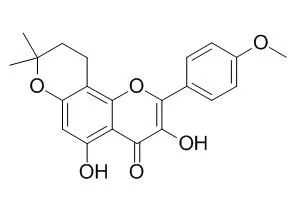| Description: |
Anhydroicaritin exhibits immunosuppressive effects and has strong activity in scavenging DPPH radical. Anhydroicaritin can improve diet-induced obesity and hyperlipidemia and alleviate insulin resistance by suppressing SREBPs activation, it can serve as a leading compound for pharmacological control of metabolic diseases. Anhydroicaritin has the potential of stimulating the formation of mineralization nodules and further speeding up the formation of bone, it possesses significant protective effects on the zymosan-induced peritonitis mice, which may be associated with the regulation ofCa2+, influx in macrophages and iNOS expression. |
| Targets: |
AMPK | mTOR | NO | IL Receptor | TNF-α | NOS | Calcium Channel |
| In vitro: |
| Xi Bao Yu Fen Zi Mian Yi Xue Za Zhi. 2012 Apr;28(4):374-6. | | Effects of anhydroicaritin on the immunologic function of mouse macrophages.[Pubmed: 22482407] | To investigate the effects of Anhydroicaritin (AHI) on the immunologic function of mouse macrophages stimulated by lipopolysaccharide (LPS) in vitro and its related immunosuppressive mechanism.
METHODS AND RESULTS:
Mouse bone marrow-derived macrophages were isolated. Then, the drug toxicology of different concentrations of AHI on macrophages was measured by CCK-8 assay. The amount of NO produced in macrophages was detected by Griess kit. The phagocytosis of macrophages to E.coli BioParticles was assayed by flow cytometry (FCM). The expression of CD69, which was the marker of early activation of macrophages, was measured by FCM combined with two-color immunofluorescent staining of cell surface antigen. Cytometric bead array (CBA) kit was used to detect the production of cytokines of macrophages stimulated by LPS.
AHI (2.5, 5, 10 μmol/L) significantly reduced the production of NO in macrophages stimulated by LPS, and inhibited the phagocytosis of activated macrophages. The results of FCM analysis showed that AHI decreased proportions of CD69 on LPS-stimulated macrophages. Furthermore, AHI downregulated the secretion of cytokines of LPS-induced macrophages.
CONCLUSIONS:
AHI, which exhibits immunosuppressive effect on the mouse macrophages stimulated by LPS, is promising to be developed as an immunosuppressive reagent. | | Journal of Shaanxi Normal University, 2012, 40(3):73-6. | | Study on antioxidant activities of icariin and anhydroicaritin[Reference: WebLink] | The antioxidant activities of the icariin and Anhydroicaritin were investigated by using 1,1-diphenyl-2-picryl-hydrazyl radical scavenging assay(DPPH·),superoxide radical scavenging assay(O2-·),hydroxyl radical scavenging assay(OH·),total antioxidant activity,and lipid peroxidation assay.
METHODS AND RESULTS:
The experiment results show that icariin exhibites strong activity in scaverging DPPH radical,superoxide radical and total antioxidation.Anhydroicaritin has stronger activity in scavenging DPPH radical than icariin,and effective inhibition against lipid peroxidation.The radical-scavenging and inhibition effects of icariin and Anhydroicaritin are dose-dependent.
CONCLUSIONS:
These results are useful for investigation and application of icariin and Anhydroicaritin. |
|
| In vivo: |
| Xi Bao Yu Fen Zi Mian Yi Xue Za Zhi. 2013 Oct;29(10):1036-9. | | Protective effect of anhydroicaritin against peritonitis in mice.[Pubmed: 24103264 ] | To investigate the effect of Anhydroicaritin (AHI) against zymosan-induced peritonitis in mice.
METHODS AND RESULTS:
Peritonitis was induced in mice by intraperitoneal injection of zymosan. All mice were monitored for systemic toxicity and mortality for 13 d after zymosan or saline administration. In another set of experiments, the peritoneal exudates were collected. The leukocyte numbers and the production of inflammatory cytokines (IL-6, IL-10, TNF-α, MCP-1) were determined by flow cytometry. The release of nitric oxide (NO) was measured by a Griess reagent system. The Ca(2+); influx in bone marrow-derived macrophages was recorded by laser scanning confocal microscopy with Fluo4-AM loading. The expression of iNOS was determined by Western blotting.
AHI (4 mg/kg) prolonged survival of peritonitis mice, inhibited massive leukocyte transmigration into the peritoneal cavity, and decreased the overproduction of NO, IL-10, TNF-α, MCP-1 and IL-6. In LPS-stimulated mouse macrophages, AHI (5 μmol/L) pretreatment significantly inhibited the elevation of intracellular Ca(2+);, and markedly decreased iNOS protein expression.
CONCLUSIONS:
AHI possesses significant protective effects on the zymosan-induced peritonitis mice, which might be associated with the regulation of Ca(2+); influx in macrophages and iNOS expression.
|
|






 Cell. 2018 Jan 11;172(1-2):249-261.e12. doi: 10.1016/j.cell.2017.12.019.IF=36.216(2019)
Cell. 2018 Jan 11;172(1-2):249-261.e12. doi: 10.1016/j.cell.2017.12.019.IF=36.216(2019) Cell Metab. 2020 Mar 3;31(3):534-548.e5. doi: 10.1016/j.cmet.2020.01.002.IF=22.415(2019)
Cell Metab. 2020 Mar 3;31(3):534-548.e5. doi: 10.1016/j.cmet.2020.01.002.IF=22.415(2019) Mol Cell. 2017 Nov 16;68(4):673-685.e6. doi: 10.1016/j.molcel.2017.10.022.IF=14.548(2019)
Mol Cell. 2017 Nov 16;68(4):673-685.e6. doi: 10.1016/j.molcel.2017.10.022.IF=14.548(2019)